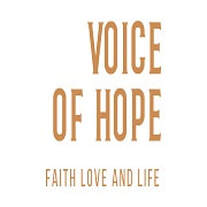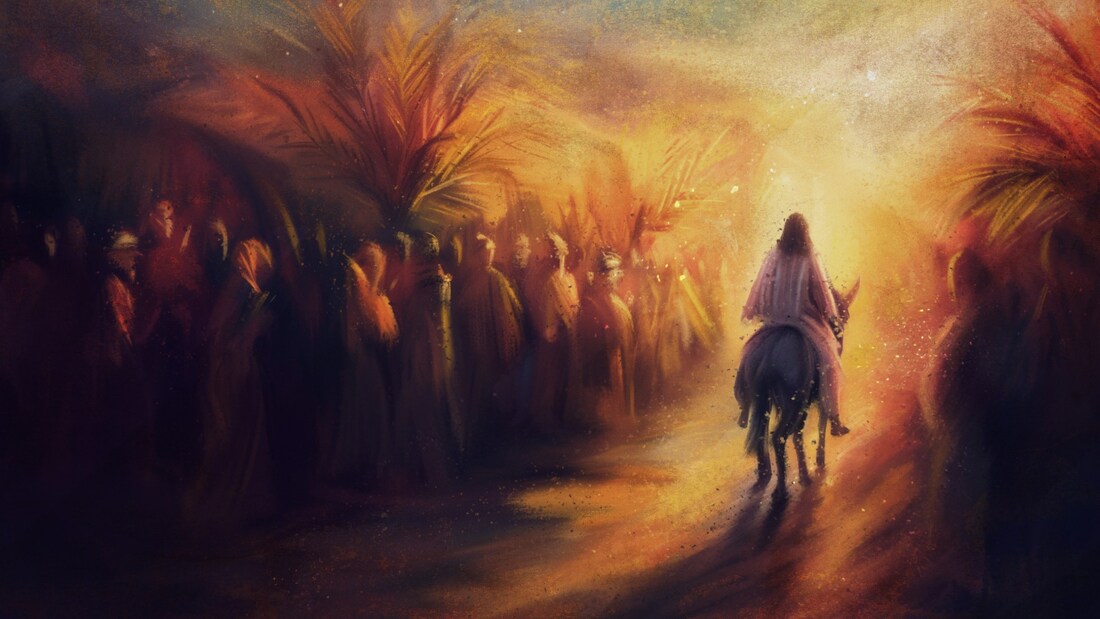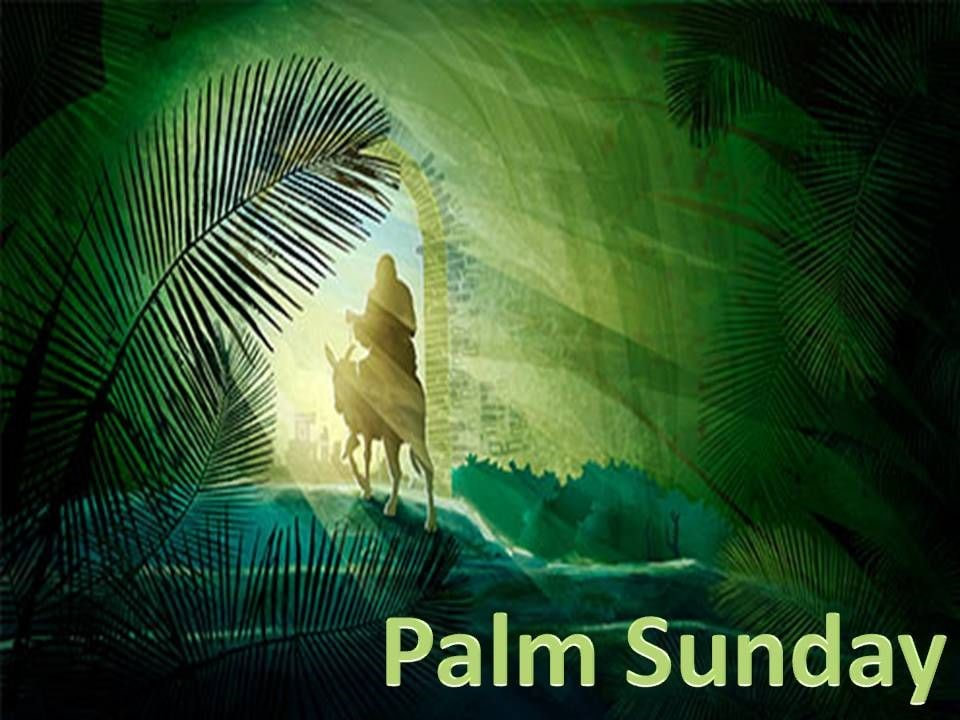|
As a member of one of our church's four worship teams, I am humbled and deeply honored to be entrusted with leading worship during one of the most cherished events in our Christian tradition, Palm Sunday. Palm Sunday, also known as the Triumphal Entry, marks the beginning of Holy Week and commemorates Jesus' arrival in Jerusalem. Riding on a donkey, he is welcomed with shouts and songs of joy while cloaks and palm branches are laid in his path. This fulfills the prophecy of Zechariah 9:9 (NIV), foretelling the arrival of a righteous and humble king. Rejoice greatly, Daughter Zion! As Jesus enters Jerusalem, a city steeped in tradition, he is greeted with jubilant shouts and songs of joy. The path before him is covered with cloaks and palm branches, a sign of honor and respect. This scene, reminiscent of the Old Testament's treatment of kings. See 2 Kings 9:13 (NIV). They quickly took their cloaks and spread them under him on the bare steps. Then they blew the trumpet and shouted, “Jehu is king!” This is a powerful affirmation of Jesus' kingship over Israel, the peak of his earthly ministry. Yet, amidst the celebration, there is a dark undertone. Jesus, in a recent prophecy, has foretold his own death. See Colossians 2:15 (NIV). And having disarmed the powers and authorities, he made a public spectacle of them, triumphing over them by the cross. This act of 'triumph' (Colossians 2:15) is a challenge to the Roman authorities. It is a signal that his mission is not one of conquest but of sacrifice. This stark contrast between the joyous celebration and the impending tragedy of Jesus' death is the true significance of Palm Sunday, a day that is also known as Passion Sunday, marking the beginning of the end of Jesus' earthly journey. The palm tree, a symbol deeply rooted in ancient Near Eastern cultures, has dual meanings on Palm Sunday. Palm branches symbolized eternal life in Egypt, and they were often seen in funeral processions. In Rome, they represented triumph and victory, a common feature in victory parades. Thus, on Palm Sunday, the palm branches embody mourning Jesus' impending death and celebrating his triumphant entry into Jerusalem. This dual symbolism adds a layer of complexity to the event, making it a unique and significant part of Christian tradition.
On Palm Sunday, churches around the world commemorate Jesus' triumphant entry into Jerusalem with a variety of traditions. One such practice is the procession, often extending into neighborhoods, where participants sing and wave palm branches. This reenactment of Jesus' entry into Jerusalem not only brings the event to life but also allows the participants to feel a part of the story. Another tradition is the crafting of palm crosses, a symbol that reminds us of the branches strewn before Jesus and prefigures his crucifixion. These crosses, often made by children, serve as a tangible reminder of the significance of Palm Sunday and its place in the Christian faith. These diverse traditions, each with its own unique significance, contribute to the rich tapestry of Palm Sunday observances. As I guide the gathering in Palm Sunday worship, I am acutely conscious of the profound significance imbued within this sacred occasion.
0 Comments
Easter is a highly celebrated event whether you are an Episcopalian, Catholic, Lutheran, Methodist, or "Christian" or some other doctrine you subscribe to. With its themes of Jesus' triumph over death and His resurrection, we prepare ourselves for the Ascension of our Lord. It is important to remember that Salvation is not just a historical event that occurred in the distant past to other people in other areas. Easter is truly an opportunity for rebirth for those who grasp it. The spiritual energies available during the resurrection are available here and now. People interested in their spiritual growth and well-being eagerly look upon the Easter season. The rituals we observe allow us time for reflection, prayer, and repentance, which can lead to our rebirth. The early Christians no longer focused on the exodus from Egyptian Bondage but on a new kind of departure from the Bondage of sin to the new life of our Risen Lord. Sometimes during the weeks preceding Easter, I have a feeling of discomfort, of sadness. I walk around moping, not entirely understanding why. Maybe it is because, in a way, I am in mourning. Perhaps, I am mourning the loss of a part of my essential self. Even though my sinfulness is something I need to eradicate, I still mourn its loss. Why do I do this? Why does anyone do this? I think it is because the behavior patterns of sin become familiar to us, and we feel oddly comforted by their familiarity. ~Marlene C Bertrand Sinfulness lies deep within a person; it is an attitude, a willingness to turn one's face away from the Creator. Often we are not even conscious of this shift away from God. Only after one realizes that he has turned his face away and separated himself can he hope for perfect reunification. But how do we move from our deeply flawed state of sin to reconciliation? The followers of Christ have been furnished with the cure. Through the saving action of Christ, each of us has been reconciled to God. Once and for all, Jesus has paid the price for us to redeem ourselves. Jesus Died For Us Jesus died on the cross. Jesus was nailed to the cross. Yes, He was nailed! If you have ever had injections at the doctor's office, you know the feeling of pain that came with that skinny little needle. And, in a few seconds, the pain was gone. Now imagine what it was like for Jesus to have nails driven into His palm as He hung on a cross so that he could bleed until He died. The weight of His body certainly added to the torrential pain. Can you imagine the pain He certainly suffered? And, He suffered that pain for you and me. Good Friday was the day Jesus died. And then He was resurrected on Easter Sunday. If we study the work and the teachings of Jesus, we find nothing but selfless giving and miraculous cures. Jesus could cure miraculously because He was the Son of God. But did He gain any material comforts? Any pleasures? Not really. He didn't gain any goods from what He did. And, still, He lived a life of giving beyond measure. We read story after story of Jesus, the man who, while He Himself suffered, took away the sufferings of others. Even His death was excruciating. And remember, He suffered that pain for you and me. He suffered that pain so that our sins could be forgiven. He sustained that pain so that our slate of sin could be wiped clean, and we can now have a genuine relationship with God, our Creator. What does Jesus' life teach us? It teaches us not to give suffering to others but take suffering ourselves. It teaches us to comfort others. It teaches us selfless giving. It teaches us to forgive even if extreme pain is inflicted upon us. It teaches us to love all and hate none. We must remember that life is a series of stops and starts, spiritual advancement and spiritual retreat. We have "spiritual growth spurts" throughout our lives until the day we die. The spiritual energy of the Easter Season affords us a unique opportunity to grasp hold of our redemption. Let us celebrate Easter Sunday, remembering the teachings and sacrifice of Jesus Christ. The Lord wants us to spread peace by living and giving selflessly. We honor Him by spreading goodness, happiness, and cheer worldwide. I hope that this Easter, you will take the opportunity to explore the reason for the season in your own life. We at Voice of Hope wish you a very Happy Easter! Photo Credits: Photo by Rodolfo Clix: https://www.pexels.com/photo/silhouette-image-of-person-praying-1615776/ Copright 2023 Marlene C Bertrand  Marlene Bertrand is an evangelist and a reputably ordained minister. In 2012, Marlene established a ministry with Christian House International to share the gospel with the world. Through Voice of Hope, Marlene hopes people will learn about the Lord, our Savior and will come to know, love, and trust Him for a life forever in the Kingdom of God. |
HOPEJoin us as we share our Christian journey of hope through faith, love and life. This blog is written by Marlene C Bertrand. Categories
All
Archives
April 2024
|




 RSS Feed
RSS Feed
